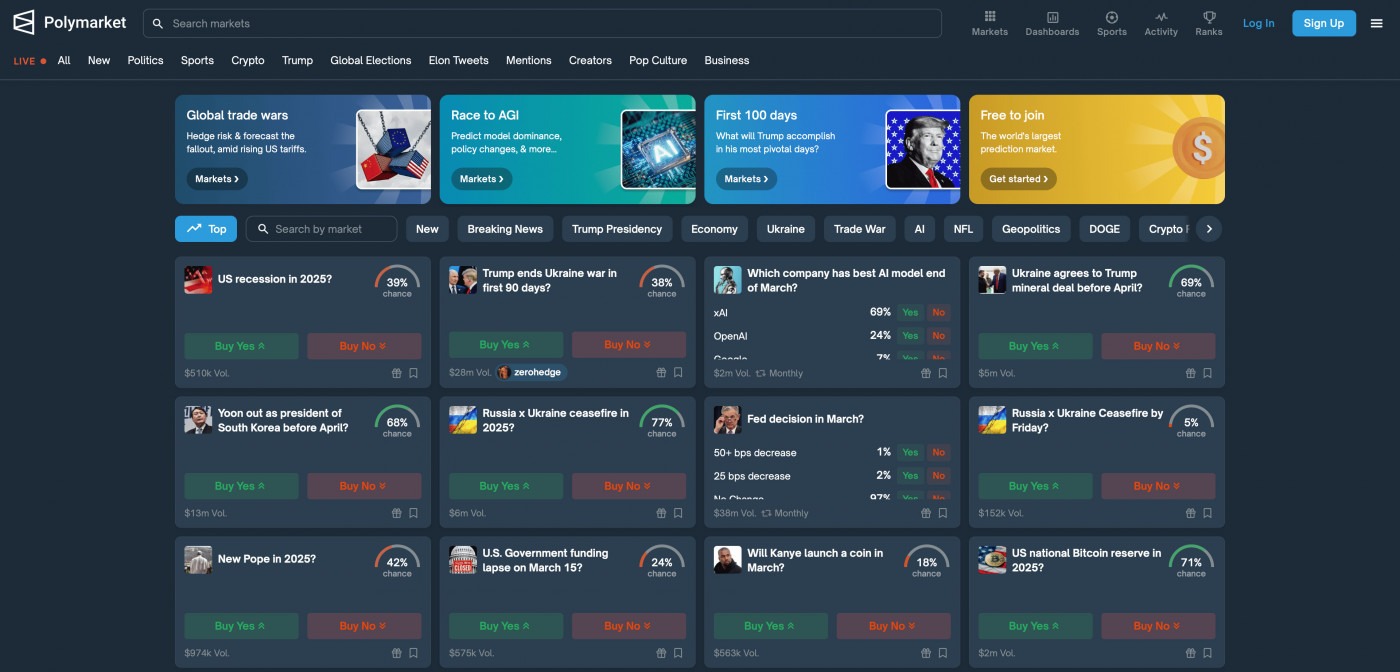Betting on the future: Gambling or guidance?
Online prediction markets, platforms that enable individuals to bet on the outcomes of events, have experienced a surge in usage following the 2024 US presidential election. Perhaps this is where its credibility was established – rightly or wrongly – as platforms like Polymarket, dubbed a ‘magical app’ by Elon Musk, gained traction. In the days prior to the election, most polls suggested that the likelihood of either Kamala Harris or President Trump winning was equivalent to a coin flip. Even models created by statistician and journalist Nate Silver reinforced these predictions. However, it was Polymarket that most accurately favoured President Trump over Kamala Harris, with Trump winning the election results with 52% to Kamala’s 48%.
A competitor to Polymarket, Kalshi, was endorsed by Trump for reflecting his higher odds – so much so that his eldest son, Donald Trump Jr., is now a strategic adviser on the company’s board. Given the political backing by the Trump administration, online prediction markets are set to grow. During the 2020 US presidential election, Polymarket recorded a betting volume of around $10 million; this surged to over $2.5 billion in the recent election. The real question is: can prediction markets be harnessed as a valuable tool for society, or are they just another form of gambling?
The accuracy of these platforms can be questioned due to distortions in the markets
Proponents of online prediction markets argue that forecasts on these platforms are more accurate than those created by polls and experts. Many supporters compare trading on prediction markets to betting, calling participants ‘traders’ who research and scrutinise data. This can be viewed as a decentralised information gathering system where accuracy is incentivised over media stories, sensationalism, and public opinion biases.
Furthermore, sites like Kalshi, Polymarket, and PredictIt appeal to free-market advocates, as financial incentives naturally encourage better predictions than that of one expert, regardless of whether individuals are well-informed. The ‘Wisdom of Crowds’ theory, popularized by James Surowiecki, suggests that a large, diverse group of people come to more accurate conclusions than those of a single expert, reinforcing this idea.
However, this proposition falls apart when we look at the demographics of the users. Contrary to the image of rational individuals carefully scrutinising information, many users on these platforms are young men, whose main sources of information are Discord and X. Perhaps, as the New York Magazine suggests, they are the most influenced by the “messy world of opinions”.
Bets were placed on the LA wildfires and the 2023 submersible Titan incident, with participants receiving thousands of dollars
Additionally, the accuracy of these platforms can be questioned due to distortions in the markets. For instance, a Polymarket user under the pseudonym “Fredi9999” was expected to receive $85 million after purchasing millions of shares betting on Trump’s victory. This raises concerns about the dilution of predictive power, as wealthy individuals with large sums can distort the probabilities. In this case, the thin line between prediction and gambling is blurred.
Ethical and regulatory concerns also remain unaddressed. Betting platforms may seem entertaining when speculating on election results, on whether America will ban TikTok, or on whether Taylor Swift and Travis Kelce will break up. However, limits may have been overstepped. Bets were placed on the LA wildfires and the 2023 submersible Titan incident, with participants receiving thousands of dollars, as stated by the Los Angeles Times. This raises the question: is it justifiable to turn events of human suffering into a money-making endeavour? Furthermore, with Brian Quintenz – a CFTC commissioner who opposes regulating betting – being nominated as the agency’s chair, the likelihood of tighter regulation appears slim.
The future of prediction markets is set to be on an upward trajectory, but whether these platforms can truly leverage the power of prediction, decisively overtake pollsters in their results, and operate within tight ethical boundaries and regulations to channel this potential into a force for good is yet to be determined.

Comments